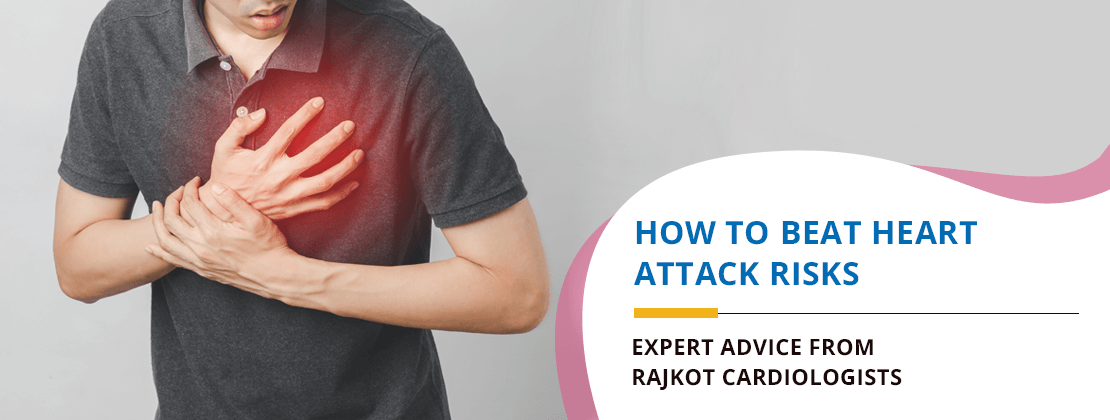
Home / Blog / How to Beat Heart Attack Risks: Expert Advice from Rajkot Cardiologists
Table of Contents
Recently, there was news of the world’s most monstrous bodybuilder, Mr. Illia “Golem” Yefimchyk, passing away at the age of 36 due to a heart attack.
He was following a strict diet; he was young; and lastly, there was no data of any underlying health condition.
This left many wondering if healthy eating and exercising do nothing to reduce heart attack risk, and it is normal to wonder so.
However, this is not entirely true. Apart from food habits and lifestyle, other factors also affect one’s chances of having a heart attack.
This article extensively discusses the different risk factors associated with heart attacks, what one should do when they have a risk of getting a heart attack & what measures to take to reduce heart attack risks.
Various risk factors contribute to increased heart attack risk. Some are lifestyle-based and controllable, while others are not related to lifestyle and cannot be modified.
Becoming aware of different risk factors is crucial, as it helps one devise appropriate heart attack prevention measures that reduce the overall risk of getting a heart attack:
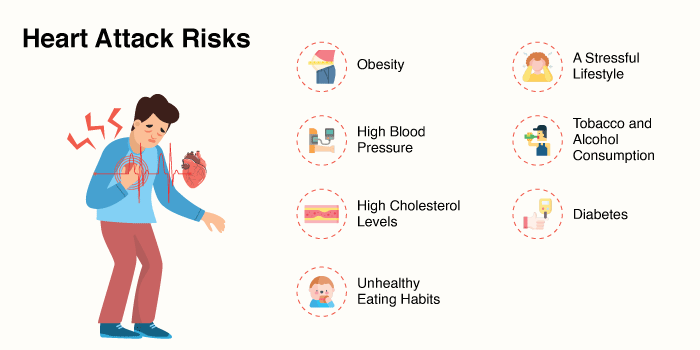
Obesity: Obesity increases heart attack risk by triggering chronic inflammation within the body and causing excess fluid buildup and heart muscle injury. Obesity also causes high blood pressure, which is another risk factor for heart attacks.
High Blood Pressure: Having high blood pressure can cause damage to the walls of the blood vessels present in the heart and increase heart attack risk.
High Cholesterol Levels: Increased levels of low-density cholesterol (LDL) double one’s risk of heart attacks. High cholesterol levels cause plaque buildup in blood vessels, which is the cause of heart attacks.
Unhealthy Eating Habits: A diet containing highly processed foods, saturated fats, added sugars, and red meat increases heart attack risk by increasing cholesterol and sugar levels and causing inflammation.
A Stressful Lifestyle: A stressful lifestyle can lead to increased blood pressure, high heart rate, inflammation, and the adoption of unhealthy behaviours, like smoking, drinking alcohol, etc.
Tobacco and Alcohol Consumption: Both tobacco and alcohol damage the blood vessels and affect their normal function, which can lead to increased heart attack risk.
Diabetes: High blood sugar levels cause damage to heart muscles and affect their normal functioning.
Age, sex (male gender), ethnicity, and family history of heart disease are the non-modifiable risk factors for heart attacks.
At HCG Hospitals, Rajkot, we have a dedicated department for cardiac care. We have some of the renowned cardiologists in Rajkot who excel in treating different types of heart conditions with specialised care.
According to cardiologists, it is critical to undergo a personalised risk assessment, which helps individuals find out the degree of heart attack risk they carry.
A physical exam, evaluation of lifestyle habits and personal and family medical history, and certain blood tests are carried out as part of the risk assessment.
Doctors recommend regular health checkups after 40 to assess the functioning of different organs, including the heart.
Regular health checkups help look for early indicators of heart disease. This is crucial for timely heart disease management.
Improving your cardiovascular health is the key to reducing your heart attack risk.
You may ask your doctor for cardiovascular health tips, which you can adopt and bring down your chances of getting a heart attack.
The following are some cardiovascular health tips or heart attack prevention measures that will minimise heart attack risk:
Adopting a healthy lifestyle is going to remarkably reduce your heart attack risk. A balanced diet comprising different macro- and micronutrients can improve heart function, protect heart health, and reduce the risk of a heart attack.
Regular exercise and an overall active lifestyle can help you reduce the risk of various cardiovascular diseases by minimising inflammation and damage to heart muscles.
Various underlying conditions, such as hypercholesteremia, diabetes, hypertension, and obesity, increase heart attack risk.
It is important to manage these conditions effectively through lifestyle modifications and medications to prevent them from hampering heart health.
Certain medications and supplements help reduce the risk of heart attacks. That said, they should be consumed only after they are prescribed by your doctor.
Some of the medications that can help prevent a heart attack include anticoagulants, anti-platelet agents, ACE inhibitors, angiotensin II receptor blockers, calcium channel blockers, beta-blockers, diuretics, vasodilators, and cholesterol-lowering medications.
Key supplements recommended to improve heart health include multivitamin and mineral supplements, omega-3 fatty acids, antioxidants (Coenzyme Q10, selenium, beta-carotene, etc.), fibres, and garlic.
A heart-healthy diet comprises different foods that improve heart functions and protect overall cardiac health.
Since a heart-healthy diet has all major macro- and micronutrients in balanced quantities, it not only improves your heart health but also contributes to your overall well-being.
Including the following foods in the daily diet can have a positive impact on the cardiac health and help reduce heart attack risk:
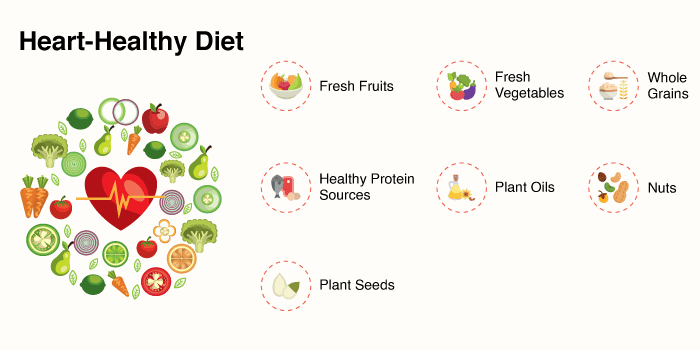
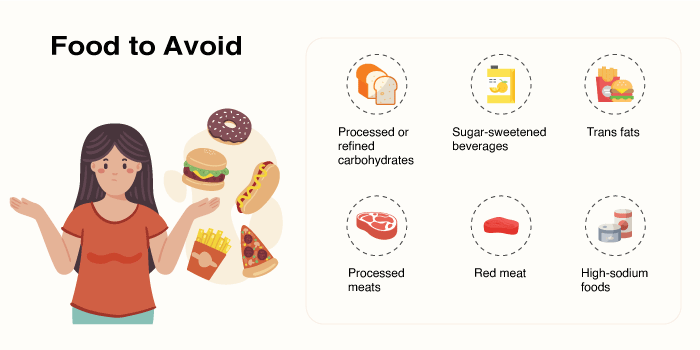
Along with incorporating healthy foods into a balanced cardiac health diet, it is also important to avoid consuming foods that contribute to increased sugar and cholesterol levels and increase your heart attack risk.
For optimum cardiac health, you should reduce the intake of or avoid the following foods:
For a proper heart-healthy diet or meal plan, you must consult a dietician, who will not only guide you on the right foods but also the portion sizes. Optimum portion sizes are crucial for healthy weight management.
That said, below is a sample meal plan for optimum cardiac health. (Note: portion sizes are not mentioned as they vary depending on each individual’s calorie intake.)
|
Breakfast (8 am – 9 am) Oatmeal with low-fat milk OR Whole wheat toast with almond or peanut butter OR Idli with sambar OR Cracked wheat upma with tomato or mint chutney |
Lunch (12 pm – 2 pm) Paneer salad or chicken salad mixed with greens OR Quinoa with vegetable stir-fry and fat-free yoghurt OR Brown rice with dal, stir-fried vegetables, and salad OR Chickpea curry with wheat rotis (flat bread) and fresh salad |
|
Snacks (4 pm – 5 pm) A fruit bowl with a glass of tender coconut OR Carrot sticks with hummus OR Mixed nuts and seeds OR Roasted chickpeas |
Dinner (8 pm – 9 pm) Lentil soup with quinoa and roasted vegetables OR Brown rice with dal and roasted vegetables OR Paneer or tofu tikka salad with vegetables |
Regular exercise and an overall active lifestyle can significantly boost cardiac health. Here’s what regular workouts can do to your heart:
Experts recommend three types of exercises for heart health: aerobic exercises, strength training exercises, and stretching exercises.
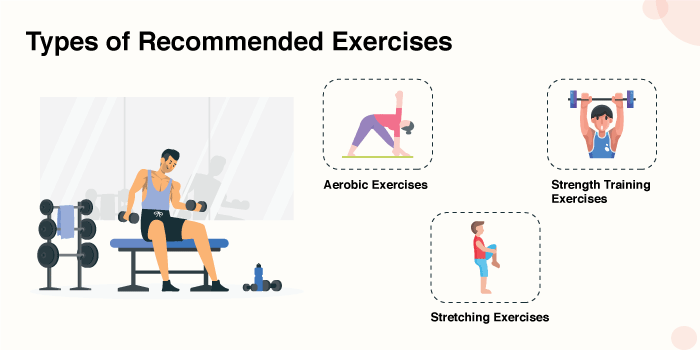
Aerobic Exercises: These exercises improve blood circulation and regulate blood pressure and heart rate. They also help reduce the risk of type 2 diabetes.
Brisk walking, jogging/running, swimming, and cycling are some of the examples of aerobic exercises.
Strength Training Exercises: These exercises help reduce body fat, especially around the belly, and reduce the risk of various cardiovascular diseases.
Weightlifting and bodyweight exercises are recommended as part of strength training.
Stretching Exercises: These exercises improve blood flow throughout the body and regulate blood pressure and heart rate.
For a personalised exercise plan, you must consult a certified fitness coach. Based on your current BMI, fitness goals, and health conditions, your coach will create a suitable fitness plan for you.
Aim for at least 150 minutes of moderate aerobic exercise per week. Go for strength training at least two days a week. Ensure you are having a balanced diet that is rich in proteins. If you are new to exercising, start small and gradually increase the intensity over weeks.
Stress management is one of the key aspects of optimum heart health. Due to our busy lifestyles, stress has become a part of our lives.
When this stress is poorly managed, it can lead to increased blood pressure, high heart rate, inflammation, and the adoption of unhealthy behaviours like smoking, drinking, etc.
Therefore, this stress should be managed through meditation and relaxation techniques, which include breathing exercises, visualization, pursuing new hobbies, etc.
Along with these techniques, adequate sleep and regular exercise can also promote better stress management.
Regular health screenings or check-ups are crucial to maintaining cardiac health and reducing the risk of various heart problems, including heart attacks.
Commonly recommended tests for monitoring heart health include:
The frequency of these screening tests may vary depending on the age and the risk factors that individuals carry.
For adults aged between 20 and 39, heart health screening should be done every 2-3 years; for those aged between 40 and 60, it should be done every 1-2 years; and for those above 60, these tests should be done annually.
Watch this video as one of our specialists guides you when to see a heart specialist:
As one of the top-ranking multispeciality hospitals in Rajkot, HCG Hospitals in Rajkot has a dedicated team of well-trained and highly experienced cardiac care teams with some of the best cardiologists in Rajkot. These specialists perfectly blend modern treatment approaches with compassionate care and help patients receive top-tier heart care.
To reach out to the best Rajkot heart specialist, please give us a call on our centralised call centre number, +91 74064 99999, or visit our website to chat with our AI care assistant, who will help you book an appointment.
Being aware of the heart attack risk factors that you carry goes a long way in reducing your heart attack risk. Doctors recommend a personalised risk assessment to determine the degree of risk you carry, and based on the results from this assessment, they recommend preventive measures that can help you reduce your heart attack risk.
Adopting and adhering to these measures can positively impact your overall health and reduce your chances of getting a heart attack.
If you are looking for the best cardiologist in Rajkot or the best cardiac surgeon in Rajkot, you may reach out to HCG Hospitals for specialised care and support.
HCG Hospitals is the best heart hospital in Rajkot. It has a dedicated department for cardiac care with a robust team of cardiologists who specialise in treating different types of heart diseases, including heart attacks.
To speak to the care team at HCG Hospitals, you may give a call at +91 74064 99999.
It is not possible to stop a heart attack; however, it is possible to control its damage through early diagnosis and treatment (primary angiography).
No foods can offer 100% prevention against heart attacks. However, some foods can help reduce its risk. Consuming protein- and fibre-rich foods that are fortified with vitamins and essential minerals can help you reduce your chances of getting a heart attack.
Cardiac rehabilitation is a specialised program available at all major multispeciality hospitals in India. This program primarily comprises nutritional counselling, personalised physical therapy plans, and lifestyle modification counselling.
Through this program, doctors devise a personalised recovery plan based on individual patient factors. The physical therapy may initially involve gentle exercises, which will be followed by moderately strenuous exercises after a few weeks.
These plans are often a careful blend of aerobic exercises, strength training exercises, and flexibility exercises.
Chest pain, tightness in the chest, pain in the upper stomach, shoulder, arms, neck, and jaws, heartburn or indigestion, cold sweat, fatigue, nausea, and shortness of breath are some of the important early warning signs of a heart attack.
Hypertension, diabetes, and hypercholesterolaemia, along with chronic inflammation, contribute to the increased heart attack risk. Healthy weight management can help regulate these cardiovascular risk factors and bring down your heart attack risk.
Poor sleep schedules, excess stress, unhealthy lifestyle habits, and certain sleep disorders increase the risk of having a heart attack during sleep.
To prevent it from happening, adopt the following measures:
Heart attacks occur when coronary arteries, which supply oxygen and nutrients to the heart, become narrowed or blocked due to the formation and rupture of waxy, cholesterol deposits called plaques.
As one of the leading multispeciality hospitals in Rajkot, we have some of the finest and most experienced cardiologists in Rajkot who deliver customised and patient-focussed cardiac care.
These treatment approaches are designed in such a way that each treatment intervention is tailored to the individual health needs of each patient. These approaches are crucial to achieving desired outcomes with a specialised focus on the quality of life of our patients.